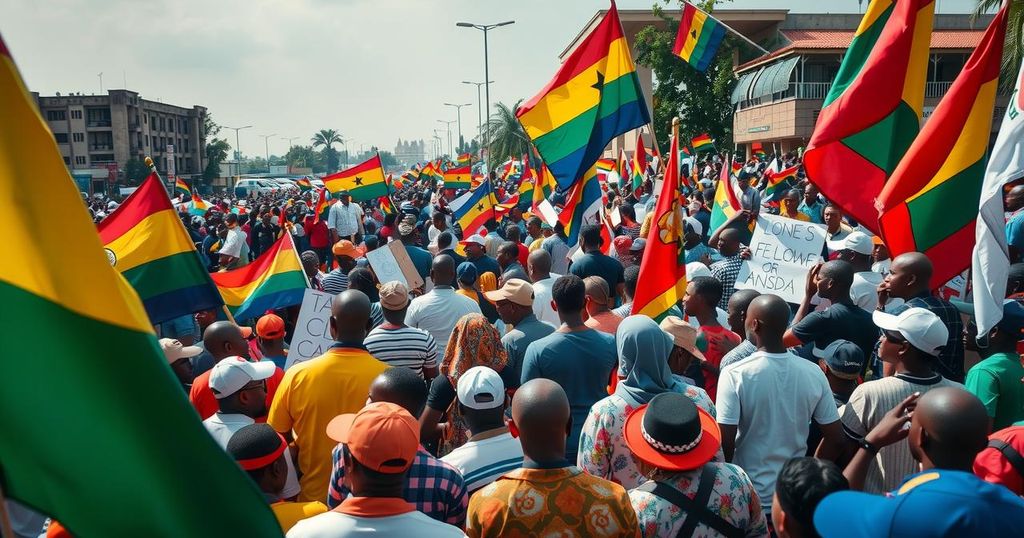Ghana’s LGBTQ+ Community Faces Elected Officials’ Anti-LGBTQ+ Stances Ahead of Elections

In the context of Ghana’s upcoming elections, presidential candidates are capitalizing on anti-LGBTQ+ sentiments, pledging to reinforce punitive measures against the community. With new legislation set to impose an array of penalties on LGBTQ+ individuals and their supporters, the atmosphere for the community remains precarious, teetering between legal scrutiny and widespread public hostility.
In the lead-up to Ghana’s general elections scheduled for December 7, the nation’s LGBTQ+ community is confronted with an unsettling reality, as major presidential candidates have committed to intensifying legislative crackdowns on gay rights to capitalize on widespread anti-LGBTQ+ sentiment. The anticipated winner will face the critical decision to either endorse or reject a contentious bill recently passed by Parliament, which imposes severe penalties on individuals identifying as LGBTQ+. Noteworthy is the Supreme Court’s impending deliberation on the bill’s constitutionality, with a ruling expected on December 18 following various legal challenges.
Mahamudu Bawumia, the ruling party’s candidate, has made it clear that he intends to sign the bill, whereas his main opponent, former president John Dramani Mahama, despite not explicitly confirming his stance, has underscored the need for stricter laws against LGBTQ+ individuals, alleging that Western influences promote homosexuality in Ghana. This political landscape leaves many in the LGBTQ+ community feeling alienated and unsafe. “These are people who are actually supposed to protect me. My vote and the rest of the community’s will put them in a position of leadership,” expressed one community member, Abena, in an interview, emphasizing her sense of exclusion.
Current law already criminalizes homosexual acts in Ghana, but this proposed legislation broadens the scope of what constitutes illegal conduct and amplifies punishments, which human rights advocates predict will further marginalize sexual and gender minorities. Under the new proposal, same-sex activities could lead to sentences of up to five years in prison, and there are provisions that penalize advocacy for LGBTQ+ rights, as well as potential incarceration for friends and family who fail to report LGBTQ+ individuals.
The ongoing discourse since the bill’s introduction in 2021 has heightened an already negative public perception of the LGBTQ+ community, supported by a 2021 Afrobarometer survey indicating a mere 7% tolerance among Ghanaians for same-sex relationships. Religious organizations have rallied in support of the bill, characterizing same-sex acts as contrary to both Christian values and Ghanaian cultural norms. “Even though it has not become law, it has seeped into the psyche of the public, which is basically homophobic,” remarked Michael Akagbor from the Centre for Democracy and Development Ghana, illustrating the atmosphere of intimidation faced by LGBTQ+ individuals.
Local activists are deeply concerned about the ramifications of this proposed legislation. Individuals like Hans Burinyuy, the director of communications at LGBT+ Rights Ghana, argue that such measures have already led many LGBTQ+ persons to conceal their identities, risking job security and educational opportunities. “If the bill becomes law, professional options for openly LGBTQ-friendly educators and advocates like me may narrow,” he stated, highlighting the increased need for caution and secrecy among LGBTQ+ individuals in a climate increasingly hostile to their existence.
The potential enactment of this bill has drawn international criticism, with the European Union denouncing its passage as profoundly alarming due to its contravention of Ghana’s constitutional rights and international obligations. The Ministry of Finance has also indicated that Ghana may face losses in donor funding should the legislation advance. As the legal proceedings regarding the bill unfold, the court’s ruling could dictate the future of LGBTQ+ rights in Ghana. However, for individuals like Abena, the court’s decision may arrive too late to influence their voting decisions. “I feel the country isn’t safe for people like me if the first, second and third options are all using the LGBT bill to score more points,” she lamented, reflecting the ongoing fear among the LGBTQ+ community.
The situation surrounding LGBTQ+ rights in Ghana is complex and fraught with societal and political tension. Homosexuality is already criminalized, and recent legislative proposals aim to bolster penalties against LGBTQ+ individuals further. This heightened focus on anti-LGBTQ+ sentiment has coincided with impending general elections, leading candidates to adopt stances that resonate with a significant portion of the electorate’s views against homosexuality. The legal landscape is compounded by a Supreme Court review concerning the constitutionality of a new anti-LGBTQ+ bill, promising to further shape the future of LGBTQ+ rights in the nation.
The political climate in Ghana’s upcoming elections raises critical concerns for the LGBTQ+ community as candidates leverage anti-LGBTQ+ sentiments for electoral gain. The proposed legislation expanding criminalization poses significant threats to civil rights and exacerbates existing discrimination. Amid this turmoil, activists and community members express fear and uncertainty regarding their safety and future, reinforcing a stark reality where LGBTQ+ individuals feel increasingly vulnerable in their own country. The international community awaits the Supreme Court’s ruling, which could potentially alter the trajectory of LGBTQ+ rights in Ghana.
Original Source: www.voanews.com







